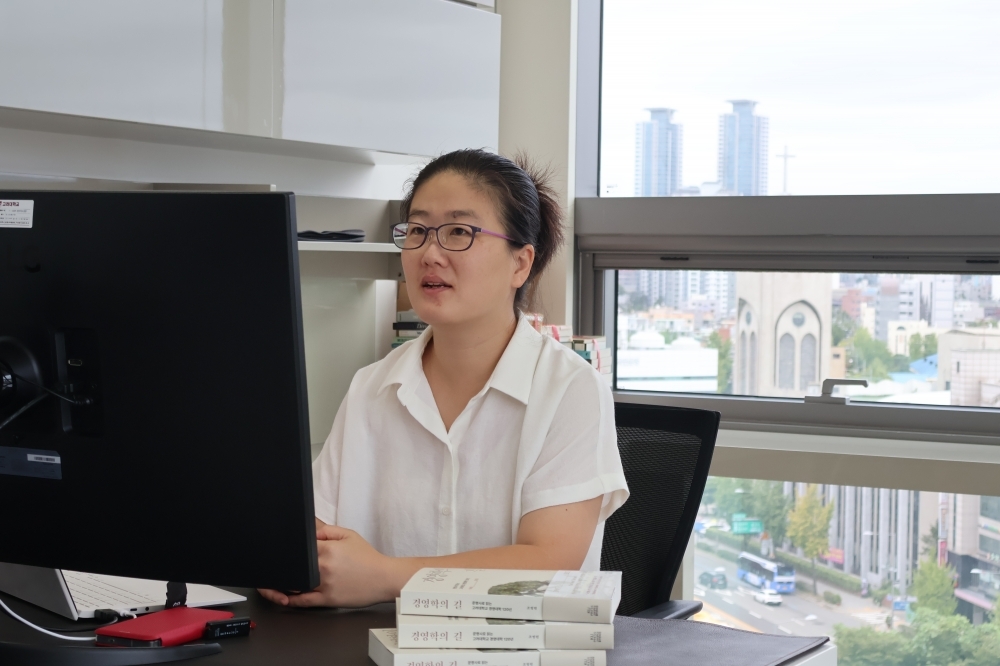News
KUBS News
[Interview with Newly Appointed Faculty for Fall 2025] Professor Juyoung Lee
2025.10.13 Views 1431 국제실
[Interview with Newly Appointed Faculty for Fall 2025] Professor Juyoung Lee — A New Beginning at My Alma Mater, Embracing the Next Challenge

In September 2025, Korea University Business School appointed five new faculty members, each bringing expertise in diverse areas of research: Professor Dae hoon Noh (LSOM), Professor Juyoung Lee (Business Administration), Professor Seunghoo Chung (Business Administration), Professor Jae Young Cho (Strategy), and Professor Angela Aerry Choi (Information Systems).
To mark the occasion, KUBS News sat down with the newly appointed professors to introduce their research interests and educational philosophies to our readers.
Q1. Please introduce yourself.
Hello, my name is Juyoung Lee, and I recently joined Korea University Business School as an Assistant Professor in the Business Administration area. I studied sociology at both Korea University and Brown University in the United States, and later transitioned into the field of business while working as a postdoctoral researcher at the Ivey Business School. Before joining Korea University, I spent four years as an Assistant Professor in the Department of Management at Hong Kong Polytechnic University.
Q2. What led you to join Korea University Business School, and how do you feel about it?
This new beginning at Korea University Business School is both a new challenge and a valuable opportunity for me to grow as a more insightful researcher and a better educator. Above all, I look forward to the meaningful experiences I’ll share with my students.
Q3. What is the research area or topic you are currently focusing on?
My current research focuses on the relationship between corporate short-termism and environmental performance. Existing studies have argued that short-term orientation hinders long-term investment and negatively impacts environmental outcomes. However, short-termism is not inherently detrimental. Firms with a short-term orientation may be better positioned to respond swiftly to urgent issues.
For instance, when peer firms are sanctioned for violating environmental regulations, short-term-oriented companies are more likely to take prompt corrective action. This study examines such responses to explore the conditions under which short-termism may positively influence environmental performance.
Q4. What is your teaching philosophy when leading classes and mentoring students?
I am currently teaching organizational theory. Through the course, I hope students move beyond the mere acquisition of knowledge and gain meaningful insights.
Organizational theory not only addresses internal organizational dynamics but also offers valuable perspectives for understanding broader social structures. I hope students will learn to view organizations and society through multiple lenses and continue developing their own independent thinking. I look forward to supporting them along the way.
Q5. Besides academic knowledge, what do you think students must learn during their college years?
Looking back on my twenties at Korea University, I can confidently say that I gained invaluable lessons that extended far beyond the classroom—lessons learned through diverse activities on and off campus, and through interactions with fellow students across all year levels.
I hope today’s students will also take this uniquely free and possibility-filled stage of life to broaden their perspectives on society through a wide range of experiences.
Q6. As a new faculty member at the Business School, what are your goals or visions for the future?
I hope to join students and senior colleagues on a shared journey of learning and discovery—working together to generate new insights and create meaningful value.
Q7. Lastly, could you offer some words of advice and encouragement to Korea University students heading out into the world?
I encourage you to face the world with confidence, live with passion, and color your life boldly with your own unique identity.


